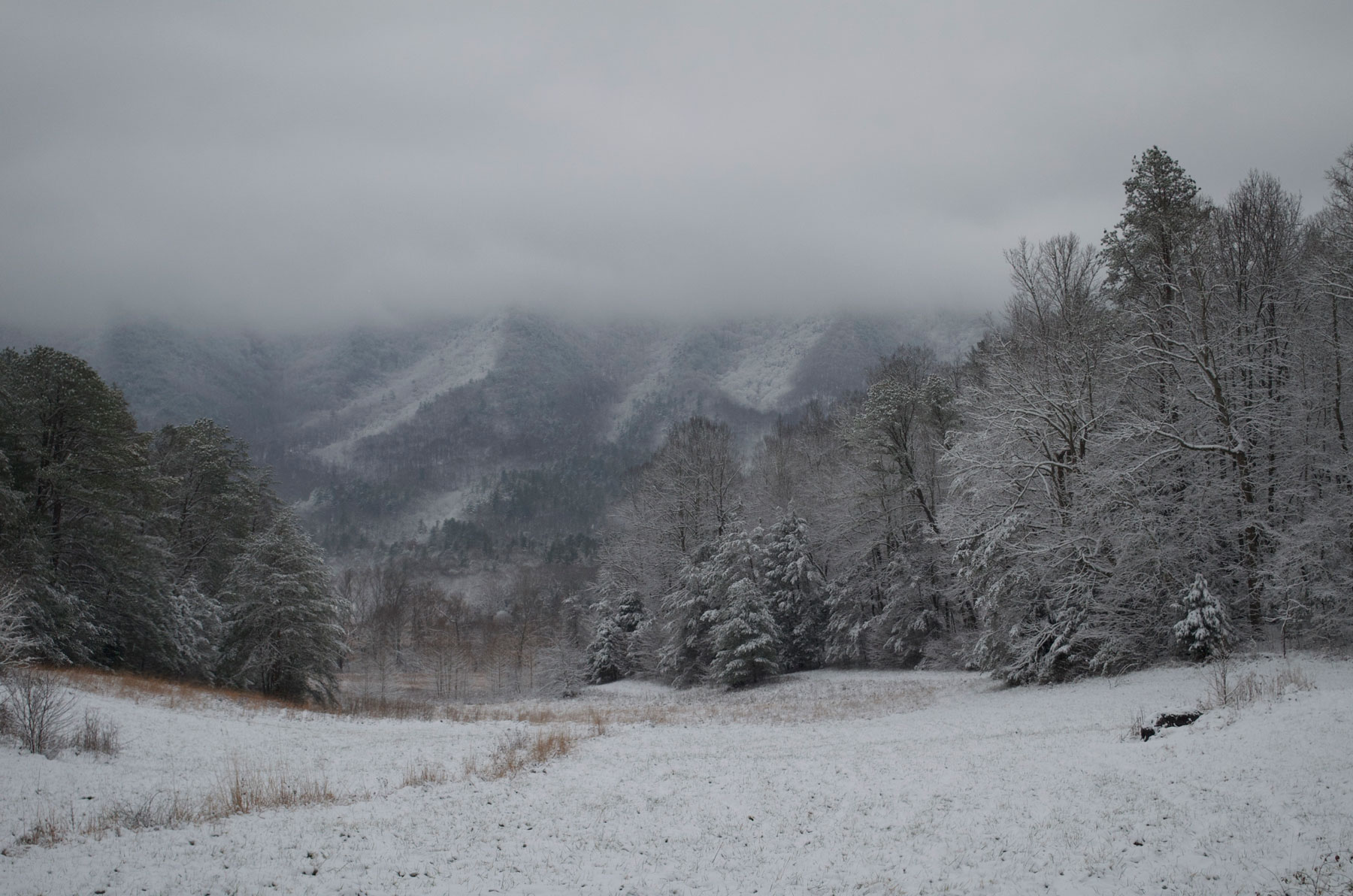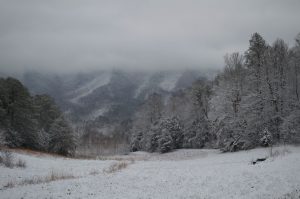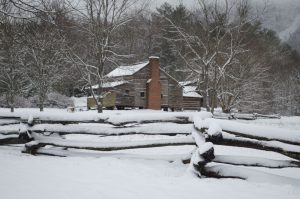
Every December, Kermit Caughron left his home in Cades Cove to travel to Knoxville, Tennessee. There, among other things, he bought a bushel of red delicious apples, a bundle of oranges, a box of bananas, and several bags of candy, including orange slices and chocolate crème drops.

Christmastime arrived in the cove, and on the first night of Christmas week, Caughron, who was born in the cove in 1912, gathered his wife, Lois, and their four children—Rex, Roy, Ruth, and Kay—in front of the fireplace.
“After supper, and when the dishes had been put away, he would have us put chairs in a semi-circle in front of the fireplace in the living room,” remembered Ruth Davis (née Caughron). “He would give each of us an apple, an orange, a banana, and a piece of each candy. We would sit there and enjoy that before we went to bed. We did that every night of Christmas week. There were four of us kids, so that bushel of apples didn’t last long.”
This was Christmas in the 1950s in that part of the Smokies, where Cades Cove remained in transition from a thriving mountain community to part of the relatively new Great Smoky Mountains National Park. In many mid-century Smokies-area homes, there were few, if any, presents under the tree—if there even was a tree—as the holidays approached.
“At school, all my friends would be talking about what Santa Claus was going to bring them,” Davis said. “We would usually get our new long-handled underwear, socks, and blue jeans as winter approached. That was close enough to Christmas that if I felt like I got backed into a corner at school about what I got for Christmas, I’d tell them I got long-handled underwear.”
Davis remembers a different Christmas when she was four, however. “My dad had gotten my older brother a little red wagon at the store,” she said. “I guess I had found a doll in the store and was looking at it. We had walked back out on the street, and my mom said, ‘I’m going back in to get that doll for Ruth.’”
Lois Caughron, now 98, lives in Maryville, Tennessee. She remembers visiting a relative’s house in the cove at Christmastime when she was four years old and receiving an orange.
“She had never seen one,” Davis said. “She thought it was a ball. She played with it for a long time before her mom got it and sliced it and shared it with the other kids. She was sad because she didn’t have a ball to play with anymore. Mama said Christmas was just another day then.”
Indeed, December was a month for butchering, protecting the fall harvest for the long winter, chopping wood for the fire, and sharing food with family and neighbors.

“They worked up hogs on Christmas Day,” Davis said. “They just did whatever had to be done. There was no exchanging of gifts or that sort of thing. It was the same with the neighbors. If they had extra vegetables or game, they would share it with each other.”
Despite what may look like challenges to us today, family members didn’t consider themselves to be living in poverty, Davis said, because they always had food to eat and clothes to wear. It was a different sort of Merry Christmas back in those mountain days, and families made the most of it.
Davis said she and her sister, Kay, brought a small tree into their home for Christmas several times when they were kids. “We’d put it in a jar on top of the radio in the corner of the living room,” she said. “My sister and I would cut little strips from the foil from gum wrappers, and those would be our icicles.”
The Caughrons lived in the Dan Lawson house in Cades Cove and later in another nearby house. A lasting memory of Christmases in those houses, Davis said, is the annual preparation of apple stack cake, a traditional mountain dessert made from apple trees in the cove.
“The cake was so good I guess we forgot we didn’t get any gifts,” she said. “We still make it from my mom’s grandmother’s recipe. Back then, they’d make them a couple weeks before Christmas and put them in the backroom to keep cool. They were special.”
The Caughrons were one of the last families to leave the cove upon establishment of the national park, but each Christmas, that taste of apple stack cake transports them back to their roots in a part of the park that, today, is now so special to so many.
Mike Hembree is a veteran journalist and the author of 14 books. He has visited 26 national parks and hopes to add many more to that list.
Subscribe to get the latest posts sent to your email.
The Great Smokies Welcome Center is located on U.S. 321 in Townsend, TN, 2 miles from the west entrance to Great Smoky Mountains National Park. Visitors can get information about things to see and do in and around the national park and shop from a wide selection of books, gifts, and other Smokies merchandise. Daily, weekly, and annual parking tags for the national park are also available.